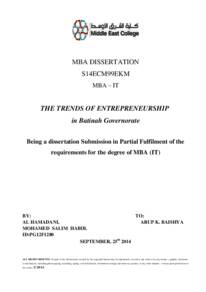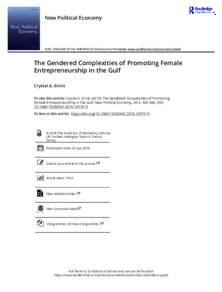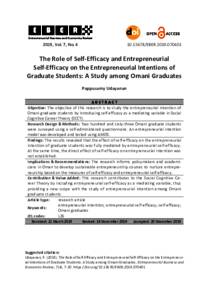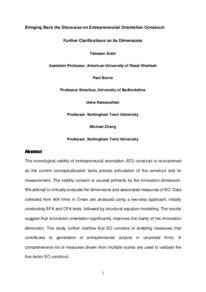Document
The trends of entrepreneurship In Batinah Governorate.
Identifier
AL Hamadani, Mohamed Salim (2014). The trends of entrepreneurship In Batinah Governorate. (Master thesis, Middle East College, Muscat, Oman).
Publisher
Middle East College.
Gregorian
2014
Language
English
English abstract
Business environments are becoming ever more dynamic and demanding. Competition gets tougher and survival within business communities is to a great extent secured by never-ending adaptations to rapidly changing circumstances. This has created a growing demand for individuals possessing entrepreneurial skills - individuals who know how to capitalize on business opportunities and turn them into prospering companies or projects.1
The most recent research on entrepreneurial success has focused on identifying environmental as well as individual factors that influence entrepreneurs' behavior and outcome of their business projects. The research on individual factors of influence has mainly been concentrated to social skills and motivation as explanatory variables of success while other personal traits, such as cognitive abilities, have been somewhat neglected. We viewed this as a shortcoming and assumed the cognitive abilities to be of major importance to the entrepreneurial field of study. (Harmreford, S. 2001)
Efforts to answer the question of what determines entrepreneurial success have been made during more than thirty years but have led to no consensus. Today, the actuality of this question is higher than ever before. All research that might lead to a better understanding of what abilities that characterize a skilled entrepreneur are hence of interest.
According to entrepreneurial theory, which originates in the 18th century, entrepreneurs are differing in their behavior compared to others. But until recently, researchers have mainly focused on social psychology or environmental factors when trying to explain why someone succeeds as an entrepreneur and what characterizes that person. The cognitive psychology was long neglected despite the fact that cognition, executive ability and personality are the main psychological factors that effect behavior.
Fortunately, this perspective has lately started to gain recognition and suggests that valuable insights into the questions of what determines entrepreneurial success may be obtained through careful comparison of the cognitive abilities of entrepreneurs and non-entrepreneurs (Baron, 1998; Delmar, 1996). Cognitive abilities are innate and refer to capabilities such as perception, attention, memory and learning, problem solving, thinking, self-efficacy and ability to express oneself. The sparse research has generally yielded disappointing results, partly due to small or poorly chosen samples but also to vague definitions of entrepreneurial performance. Furthermore, test batteries of high statistical power and objectivity are hard to find. Another drawback of the few studies focusing on cognition as an explanatory variable of entrepreneurial success is that academic rather than practical, or tacit, intelligence is being measured. Still, an extensive body of research indicates that real-life performance relies more on practical intelligence than on academic skills (Delmar, 1996). The Sultanate of Oman has a diversified economy, unlike many of its neighboring nations that rely almost entirely on oil revenues. Natural gas and several non-energy business sectors, such as tourism, fishing, light manufacturing, and agriculture are expanding rapidly. The Omani economy is one of the freest in its region. A relatively stable government and low taxes make Oman a desirable location for entrepreneurial ventures. Furthermore, foreign direct investment is welcomed. Tourism is the most attractive area for international entrepreneurs. Oil revenues, coupled with increasing foreign investment are likely to both diversify the Omani economic base and strengthen it. (Shachmurove, Y. 2009) Although Oman is not as rich in oil as some of its Arabic neighbors, oil production has been a major component of Oman's GDP since commercial export of oil began in 1967. During the 1980s and 1990s, the Omani economy was highly susceptible to fluctuating oil prices. In response to diminishing oil reserves, the Omani government has taken serious measures to enhance its natural gas resource facilities and related businesses, as well as to expand non-oil and non-energy related industries such as light manufacturing, agriculture, fisheries, and tourism. (Shachmurove, Y. 2009)
Member of
Resource URL
Category
Theses and Dissertations







